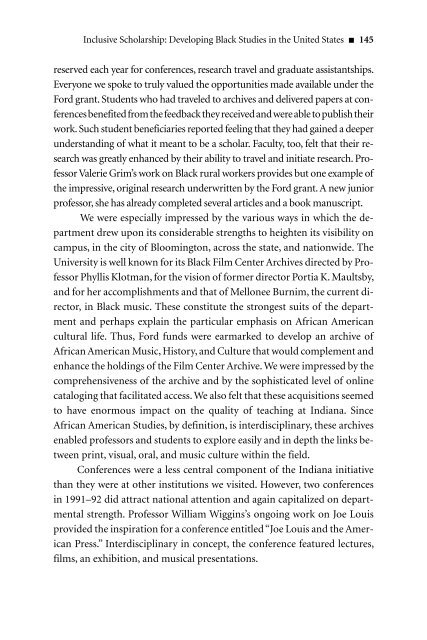Inclusive Scholarship: Developing Black Studies - Ford Foundation
Inclusive Scholarship: Developing Black Studies - Ford Foundation
Inclusive Scholarship: Developing Black Studies - Ford Foundation
You also want an ePaper? Increase the reach of your titles
YUMPU automatically turns print PDFs into web optimized ePapers that Google loves.
<strong>Inclusive</strong> <strong>Scholarship</strong>: <strong>Developing</strong> <strong>Black</strong> <strong>Studies</strong> in the United States 145<br />
reserved each year for conferences, research travel and graduate assistantships.<br />
Everyone we spoke to truly valued the opportunities made available under the<br />
<strong>Ford</strong> grant. Students who had traveled to archives and delivered papers at conferencesbenefitedfromthefeedbacktheyreceivedandwereabletopublishtheir<br />
work. Such student beneficiaries reported feeling that they had gained a deeper<br />
understanding of what it meant to be a scholar. Faculty, too, felt that their research<br />
was greatly enhanced by their ability to travel and initiate research. Professor<br />
Valerie Grim’s work on <strong>Black</strong> rural workers provides but one example of<br />
the impressive, original research underwritten by the <strong>Ford</strong> grant. A new junior<br />
professor, she has already completed several articles and a book manuscript.<br />
We were especially impressed by the various ways in which the department<br />
drew upon its considerable strengths to heighten its visibility on<br />
campus, in the city of Bloomington, across the state, and nationwide. The<br />
University is well known for its <strong>Black</strong> Film Center Archives directed by Professor<br />
Phyllis Klotman, for the vision of former director Portia K. Maultsby,<br />
and for her accomplishments and that of Mellonee Burnim, the current director,<br />
in <strong>Black</strong> music. These constitute the strongest suits of the department<br />
and perhaps explain the particular emphasis on African American<br />
cultural life. Thus, <strong>Ford</strong> funds were earmarked to develop an archive of<br />
African American Music, History, and Culture that would complement and<br />
enhance the holdings of the Film Center Archive. We were impressed by the<br />
comprehensiveness of the archive and by the sophisticated level of online<br />
cataloging that facilitated access. We also felt that these acquisitions seemed<br />
to have enormous impact on the quality of teaching at Indiana. Since<br />
African American <strong>Studies</strong>, by definition, is interdisciplinary, these archives<br />
enabled professors and students to explore easily and in depth the links between<br />
print, visual, oral, and music culture within the field.<br />
Conferences were a less central component of the Indiana initiative<br />
than they were at other institutions we visited. However, two conferences<br />
in 1991–92 did attract national attention and again capitalized on departmental<br />
strength. Professor William Wiggins’s ongoing work on Joe Louis<br />
provided the inspiration for a conference entitled “Joe Louis and the American<br />
Press.” Interdisciplinary in concept, the conference featured lectures,<br />
films, an exhibition, and musical presentations.

















